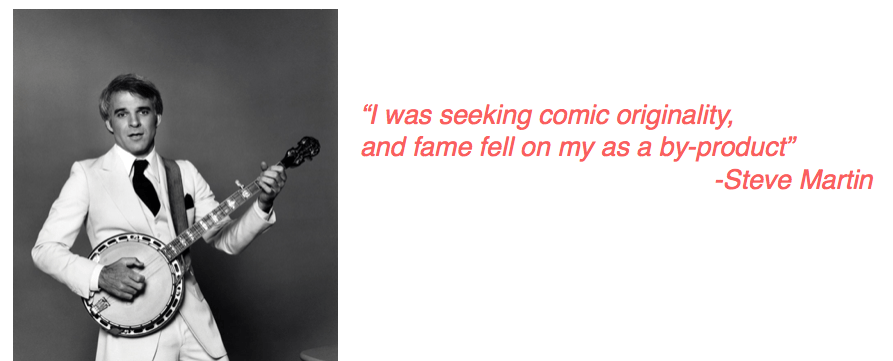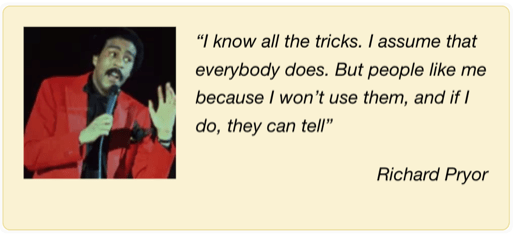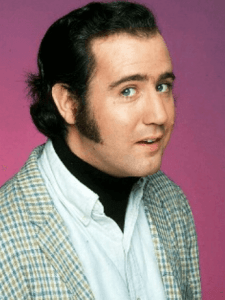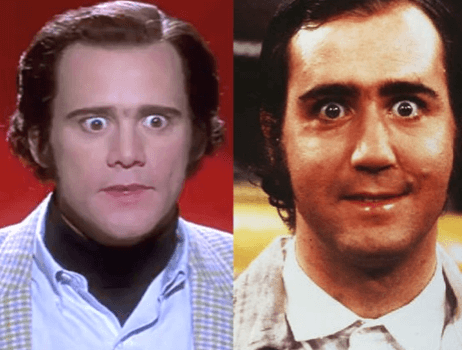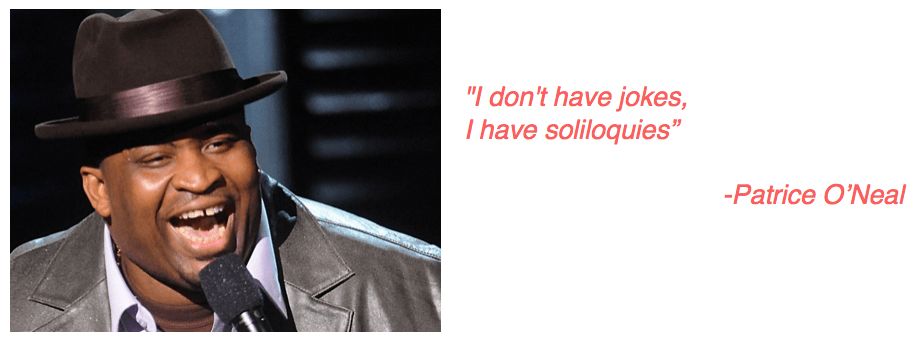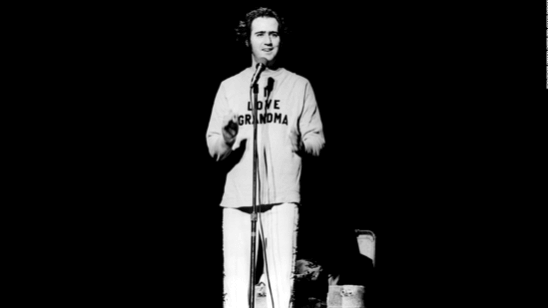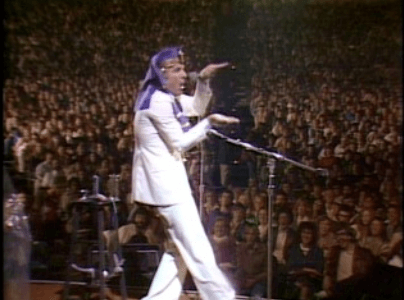The 3 Pillars of Remarkable Comedians
How No-Name Comedians Kill It On Stage and Grow Their Fan Base
Many new comedians think comedy success is about writing the best punchlines. They view success in stand-up similar to success in other jobs: effectiveness and motivation leads to success. They assume that success looks like this:
- Learn how to write & tell jokes
- Use motivation and desire for success to write better and better jokes.
- Eventually, you’ll have the “best jokes” and, therefore, you’ll be the “best comedian.”
While improving material is obviously important, this is way too narrow a view of success. I call this strategy The Effectiveness Treadmill because you’re always working hard and never actually getting anywhere.
A treadmill is a perfect analogy for 2 reasons:
First, the more motivated you are to compete on jokes, the higher you’ll crank up the treadmill.
I know this from personal experience. I ran myself into the ground trying “to win.” My philosophy was “If someone beats me then it sure as hell isn’t going to be because they wanted it more.” I thought this philosophy would practically guarantee my success, but it made me so focused on “writing better jokes” that I missed all of the creative opportunities to my left and right.
Second, even a complete idiot could step off and pass someone on a treadmill.
Motivation is only important when it’s being put towards the right goal. The faster you crank up The Effectiveness Treadmill, the less creative you’ll be. Strangely enough, it’s the “slightly” lazy people who often win in creative industries simply because they’re more likely to notice opportunities. They find an easier path that goes straight to the top. Meanwhile, the highly competitive people are trying to force a conventional strategy to work.
Here’s a hard truth…
Creativity isn’t fair.
Creativity isn’t supposed to be fair.
Creativity is incredibly unfair –
but only to the uncreative.
Three Pillars of Successful Comedians
Great comedians share three characteristics, regardless of style. These 3 pillars didn’t come from nowhere. They evolved with the industry as a whole.
- The Pillar of Effectiveness
- The Pillar of Uniqueness
- The Pillar of Authenticity
Pillar of Effectiveness
Let’s start with the obvious one: The Pillar of Effectiveness. Being effective as a comedian comes down to your ability to get laughs, both in quantity and quality.
This is the default for most comedians. It’s how the majority of open-mic comedians compete with one another. They’re all jockeying for position as “the funniest” or “the best.”
The problem with this is that it neglects creativity. It assumes that we know everything audiences like and that “the winner” is whoever gives the audience the most of what they already want.
If this was true, only joke-telling comedians would be successful, since they get to punchlines quicker than storytellers. Yet history says the opposite. It’s the storytellers that audiences fall in love with.
Effectiveness isn’t about time spent writing or how much material you can create. The audience doesn’t care if it took you one minute or one week to write your material. In the end, what you and the audience really care about is the result. If you spend eight hours cranking out hacky jokes, you’ve done yourself no favors. But the opposite is also true. Your greatest material might (and often does) come while you’re in the shower or driving. If you want to know more, I discuss why this works and how to use it to your advantage in Creativity For Comedians. Everything we do as comedians should be aimed at connecting with the audience on a deeper level, because in the end, that’s what audiences are going to remember.
No comedian exemplifies a heavy focus on effectiveness like Bob Hope. With the help of a staff of writers, Hope amassed a library of over one million jokes.
I grew up with six brothers. That’s how I learned to dance
– waiting for the bathroom.
-Bob Hope
At its core, a joke is a bite-sized piece of humor. It’s self-contained in that it doesn’t require anything before or after it to make it work. There’s a clear beginning and a clear end. The setup is as short as possible and the punchline packs as much surprise as possible. They’re designed to maximize effectiveness.
In the earliest years of the comedy industry, jokes were extremely effective. Effectiveness was the first (and only) pillar. The comedians that mastered joke-writing rose to the top.
However, by the late 1950’s, audiences were starting to realize what comedians were doing: setup, setup, punchline. Repeat. The magic of jokes started to fade.
In the 1960’s, comedians like Woody Allen started bringing lots of personality into their performances. For the first time, comedians weren’t just competing on “what” was said, but also on “how” the joke was told. The quirky Woody Allen stepped off The Effectiveness Treadmill and skyrocketed to success despite being a sub-par performer. If you compare the joke-writing skills of Hope and Allen, Hope is the clear winner… and not by a little. Hope was far superior. Hope’s material was always very tight (very few unnecessary words) while Allen’s stories were often all over the place. Yet Hope’s popularity declined while comedians like Woody Allen and Bill Cosby became the new cultural icons.
As the industry evolved into the late 60’s, the Second Pillar of Comedy Success emerged.
Pillar of Uniqueness
The Pillar of Effectiveness is about being able to compete with others and get laughs. The second pillar, the Pillar of Uniqueness, is about breaking out of the competitive mindset and drawing humor from your unique personality.
If you ask someone what they wanted in a new cell phone in 2010, they’d give you very predictable answers: lighter, wider, a better screen, a better battery, etc. What they would never have said is that they wanted a fingerprint sensor or an eye scanner (or anything unique). But once they saw those things, their desires changed. They gave up what they thought they wanted for what they now see they can have.
This is how the then-unknown Woody Allen was able to succeed against one of the most successful comedians of all time, Bob Hope. Once audiences saw personality being injected into a performance, they realized they could have something new… something unique. It no longer mattered how good Bob Hope’s jokes were because Woody Allen was so different. One comedian’s success didn’t effect the other. But Woody Allen took only a small step forward.
Allen and Cosby had only dipped their toe in the pool. In the 1970’s, comedians like Richard Pryor, George Carlin, Steve Martin, and Andy Kaufman would do a full-on cannonball. For the first time in comedy history, personality and uniqueness played the dominant role in a comedian’s success, not effectiveness. Comedy became edgy and full of personality. Effectiveness was an afterthought. Comedians were so wildly successful during this time that the 70’s is known as The Golden Age of Comedy.
When you play your own game, it no longer matters how funny another comedian is, because you’re playing different games. Think about it: it’s almost impossible to compare Jerry Seinfeld and Dave Chapelle in any meaningful way. The two are playing by wildly different rules. The success of one doesn’t affect the other. This doesn’t just work for A-list comedians like Seinfeld and Chapelle. It works for open mic, semi-pro, and professional comedians as well. Audiences have always, and will always, value uniqueness.
This is the complete opposite mindset of most open-mic comedians. They’re constantly worried because there are only so many spots on great shows. When you fail to differentiate yourself as a comedian, it results in more competition. If you’re not unique in “how” you deliver your material (personality) than you’d better have amazing content. If you’re competing on “what” you say, the odds aren’t in your favor. This is why so few joke writers are able to rise to the top of the industry (and even they tend to have a lot of personality mixed into the jokes). Joke writer’s are at a huge disadvantage when it comes to uniqueness and ability to connect with the audience. They’re like a desperate man… hoping a canned pick-up line is going to woo the girl at the bar.
So what’s the main source of uniqueness? It shouldn’t surprise you. Successful comedians tap into their full personality to become unique. And when you’re not hiding behind overly structured setups and punchlines, tapping into your personality is really quite easy. The only reason stage persona and authenticity are confusing topics for new comedians is because they’re being taught to use jokes that strip away personality. Personality was never a confusing subject for you when using your natural sense of humor. If stage persona confuses you, you’re doing it all wrong.
Comedians don’t need more personality. They just need to stop covering up the personality they already have. It’s something you lose, not something you gain. Comedians that ooze personality aren’t any crazier or different than you or me. They simply allow their complete, quirky selves to come through.
We’re all incredibly unique. The question is only whether we show that uniqueness or if we show the “socialized” side of our personality – the one that’s safe. You almost certainly have a person or group of people that you already act crazy/silly around. Being a great comedian is about sharing that person, the real you. The “you” that you allow yourself to be when you’re around your closest friends. If you learn how to consistently tap that person then you won’t need me or anyone else to guide you.
The most unique comedian who has ever lived was Andy Kaufman… The King of Practical Jokes. He loved practical jokes so much that decades after his death, people still aren’t entirely sure that he actually died. When he was diagnosed with cancer, the tabloids refused to cover the story because Kaufman had fooled them so many times in the past. Kaufman was the first and last of his kind. You can get a good feel from Kaufman’s uniqueness by watching the movie Man On The Moon starring Jim Carrey.
In one bit, Kaufman eats a bowl of ice-cream on stage and keeps the audience laughing throughout without saying a word. The genius of this bit begins when he turns on a small radio on the table. The microphone picks up the sounds in the room and then plays it through the speaker a few seconds later. The laughter starts very small but then grows rapidly as the audience realizes what’s happening. Each time the speaker plays the audience’s laugh back to them it causes the audience to laugh again. The audience was literally laughing at itself while Kaufman ate ice cream.
When you inject uniqueness and personality into your performances, you’re no longer competing with what jokes you have, but how you’re telling them. And that means you no longer need to worry (or even care) what other comedians are doing. That’s true from the top to the bottom of the industry.
Pillar of Authenticity
So, the first pillar is about being able to compete with other comedians and the second pillar is about refusing to blend in and pursuing your uniqueness. The third pillar is the Pillar of Authenticity. It doesn’t matter how good of a writer you are, the only way to gain a massive fan following is to create a connection with the audience. That connection doesn’t come through effectiveness or uniqueness… It comes through authenticity.
Authenticity is so important to human survival that it’s actually wired into the brain. That’s why there isn’t a civilization in the world that values inauthenticity. We’re naturally repulsed by it. Importantly, these emotions are handled by the unconscious brain. We don’t consciously think, “Hmm. It’s Monday. I think I’ll be mad today.” We just are. It’s unconscious.
This means…
- We’re not making a choice to like authenticity. If you’re a human, you already value it.
- We’re unaware of the importance of authenticity because it’s not something we have to think about.
Comedians that feel fake are more likely to repulse audiences instead of attract them, even if they’re funny. Creating a fan-base is not just a question of being funny, and being unique only gives the audience something interesting that they could connect to. Your fanbase is a direct result of your ability to connect with audiences on a deeper level.
This is why storytelling is so powerful. It’s completely authentic and natural. It’s engaging the audience like a real human being instead of like a calculated robot. When people are authentic, we connect with them. Since we love comedy so much, we’re naturally going to choose to connect with the audience in a funny way.
In everyday life, we like to know that people are being real with us. In a deep relationship, we don’t mind when people have faults – it’s the people that hide their faults that scare us! On stage, just like in real life, what you lose in “not looking like a ‘perfect person,” you more than make up for in connection. Audiences didn’t just “forgive” Woody Allen’s imperfections… they loved them. A large part of his comedic power came from being seen as a lovable, neurotic person. Audiences flocked to Richard Pryor because he was the first comedian to allow himself to be vulnerable. He was authentic in a way that had never been seen before. He never took “cheap shots” to get a quick joke. George Carlin became a sharp-witted social commentator. He spent over 40 years selling out arenas by arguing for what he believed. Authenticity was at his core.
I count myself very lucky. It wasn’t very long after rejecting joke-telling and pursuing my own uniqueness that I began working with Kyle Cease. While Kyle isn’t quite a household name, he’s one of the most talented comedians working today. He holds the all-time record for most college performances and was voted as having the #1 Comedy Central Special of 2009. Through the years that I’ve known him, I’ve consistently been blown away by his authenticity. He is exactly the same person off stage as on stage.
Kyle’s authenticity doesn’t come from telling stories of childhood trauma or admitting guilty pleasures. It comes from a consistent commitment to approaching every moment with a childlike playfulness. He refuses to conform to the norms of stand-up comedy. He refuses to take himself seriously.
During his Wake Up College Tour he liked to tell college students the story of his early work with Comedy Central. His Comedy Central debut was only a few minutes long but it scared the hell out of him. He was so afraid of messing up on TV that he sped through his material as fast as he could while holding onto the microphone stand to make sure he didn’t fall over or pass out. Hardly the poster-child for authenticity. To his surprise, the network liked him and offered him his very own Comedy Central Special, which would eventually become the highest rated special of 2009, narrowly beating out the emerging comedy star Jeff Dunham for the top slot.
Between the 2 shows Kyle reinvented himself. He didn’t suddenly throw out all his material (Comedy Central wouldn’t have been too happy if he did). But he knew he couldn’t take another several months of worrying about the future… so he committed himself to staying playful in the moment.
When the time came to shoot his special, Kyle didn’t play by Comedy Central’s rules. TV viewers wouldn’t know it, but there’s a teleprompter on the back wall to make sure the performer doesn’t have any problems while the cameras are rolling. There are two important rules for the taping:
- Stick to the script– TV isn’t the time to try anything new.
- Don’t do crowd work– You can’t be 100% sure what will happen when you engage the audience. If something went wrong, editing around it would be a nightmare and could possibly ruin the special.
During the taping, Kyle Cease blew both of those rules. He jumped around his material so much that the teleprompter guy eventually gave up trying to figure out what was being said or what he would be said next. Kyle also included his signature crowd work, a mixture of high-energy tangents and self-commentary.
Kyle hit all three of the pillars we’ve been talking about in this chapter. He was incredibly effective as a performer. He had over a decade worth of material to rely on, even though he wasn’t entirely sure which material he’d say that night. He was also incredibly unique. He was playful in a way that most comedians don’t allow themselves to be. He was also the only comedian to do crowd work or improvise on the show. But more than either of those, he was incredibly authentic. He didn’t feel like “a comedian.” He felt more like your best friend from high school. That feeling wasn’t lost on Comedy Central viewers when it came time to vote for the best special of the year.
Patrice O’Neal is another good example of authenticity. In one of his best bits he tries to explain “What men actually want in a relationship.” His commentary strikes a chord with the audience. Just by starting his story from a very authentic place, he got the audience to completely buy into the entire bit. Even the women in the audience were identify with his POV. If you removed his authenticity and simply read through his material looking for jokes, there wouldn’t be much there. The biggest laugh he got in his bit was from a very simple and honest observation that the whole audience could identify with.
For most comedians, your stage persona and your true personality will be nearly identical. Comedians with a stage persona different from their off-stage persona can still be seen as authentic, as long as everything about their persona makes sense.
It’s like a sci-fi movie. The audience will accept a world where people can fly and aliens can shape-shift, but only if the rules are consistent. If you’re halfway through a movie and the main character can suddenly fly, you’d feel the screenwriter cheated. But you have no problem with flying in Superman or Peter Pan. The authenticity comes from consistency.
The same thing is true for a comedian’s authenticity. Everything doesn’t have to make sense compared to actual reality, it only has to make sense for the persona. It makes sense based on the world you’ve built.
Here are some examples of great comedians who built a consistent persona that was very different from their off-stage personality: Rodney Dangerfield (“I get no respect” ), Andy Kaufman (wild practical joker), Steve Martin (anti-comedy), and Andrew Dice Clay (“I’m a badass”). These comedians gained their power not from holding up a mirror to reality, like many comedians successfully do, but by offering an incredibly unique perspective by stretching reality.
Interestingly, the number one rule of anti-comedy is to never let the audience know you’re bombing. It’s not the incredibly stupid joke that gets a laugh… it’s usually how smug and self-assured the comedian is while he says it. Anti-comedy, like all forms of comedy, is rooted in authenticity. Without consistency, both comedy and anti-comedy lose its power.
So, the Pillar of Authenticity is all about creating a connection with the audience. By basing your career on all three pillars, you become a comedian that knows how to get laughs (worth listening to), can be seen as unique and special (worth remembering), and can also create a deep connection with the audience (worth talking about). This is a night-and-day difference from just trying to “tell the funniest jokes.” If you had to bet your life savings on which type of comedian would become successful, which would you choose? Are you willing to bet your own career on it?
(If you are, you’re a helluva lot braver than me).
Remarkableness
Sitting on top of these three pillars is Remarkableness. Being remarkable is all about being “worth talking about.” When you’re effective, unique, and authentic… you’ll be worth talking about. Nothing makes your performance more powerful than having all three pillars in place.
But if one of these pillars crumbles, your remarkableness crumbles with it. If you’re unique and you’re able to come out like a real person instead of a robot, but you can’t get an audience laughing, nobody’s going to be talking about you at the end of the show. If you’re effective and authentic but you’re blending in with every other comedian on a show, nobody’s going to talk about you.
Most new comedians only focus on effectiveness, which is why they are rarely worth talking about. Other comedians are able to capture a little authenticity, as well. But few comedians really take the time to tap their uniqueness and inject a lot of personality into performances. When you’re unique, you get noticed. When you get noticed and you’re effective, you get remembered. When you connect with the audience on a deeper level, you become the type of comedian than can drive audiences wild… and you become remarkable.
How No-Name Comedians Created A Fan-Base
This is how no-name comedians create a following. They don’t gain fans one-by-one. They become remarkable, and their fan base grows exponentially as a result.
The strategy of these remarkable comedians is so simple and so effective that it’s amazing how few comedians actually use it. Remarkable comedians drive one type of audience member wild. They over-serve this specific audience so much that those one or two audience members tell their friends (friends generally have the same sense of humor). The next time, those people bring several friends. Now, instead of having one or two audience members who are perfect for their senses of humor, they have five or ten… which means they get more laughter on stage… making them even more fans… and the circle of awesomeness grows on and on. Eventually, the system tips. The comedian who was once a niche comedian goes mainstream.
Think about your 3 favorite comedians. How many of them did you find and how many were recommended to you? When I was doing live comedy classes, I found that quite often that all three of my students’ favorite comedians were recommended by friends. In fact, it’s pretty rare to “stumble” upon great comedians. You’re much more likely to have them recommended to you by people with a similar sense of humor.
This is exactly how Steve Martin became the top-grossing comedian of all time, even though he started out as a niche comedian. Very few people liked “anti-comedy” in the beginning. It was so wildly different than anything that audiences had ever seen that many people didn’t know what to think about it… but for the few that like it, Steve Martin was the only comedian worth talking about. Martin didn’t convince people to become his fans… his fans did. All he had to do was remain consistent with the world that he built and his fans adored.
When comedians develop a strong POV, it becomes really easy to get audiences engaged.
…and by the way, in case you’re wondering… my top 3 comedians are Richard Jeni, Eddie Izzard, and Steve Martin. All three were recommended to me by friends and all three have helped shape my own approach to comedy.


